EU plastic bag plans ‘lacking ambition’, says CoR

Plans to reduce the number of plastic bags in Europe came under fire today (4 April), as local and regional authorities criticised the European Commission’s plastic bag reduction proposals as ‘lacking ambition’.
According to a draft amendment to the Packaging and Packaging Waste Directive backed by the European Committee on the Environment, Public Health and Food Safety (ENVI) in March, all member states of the European Union (EU) will have to reduce plastic bag consumption by 80 per cent by 2019.
It is hoped that by reducing the amount of plastic bags consumed, the amount of plastic bags littered (which can cause environmental damage, especially when trapped in waterways) will also fall.
The law will relate to lightweight plastic bags with a thickness below 50 microns, which reportedly represent around 90 per cent of all plastic bags currently used in the EU.
The legislation will also require that any lightweight bags used to protect food (such as loose fruits, vegetables and confectionary) will need to be made of recycled paper or biodegradable and compostable material by 2019.
CoR proposals
However, members of the EU’s Committee of the Regions (CoR) have approved a report setting out ‘far tougher proposals’ than those laid out by the European Commission.
The committee is calling for an ‘outright ban’ of free plastic bags by 2020, mandatory EU targets to reduce the number of single-use plastic bags for all member states, and obligatory charges for all carrier bags (whether single- or multiple-use).
The report reads:‘[T]he European Commission proposal is not ambitious enough for the prevention of lightweight plastic bags. [CoR] calls on the European Parliament and Council to consider:
- a change in the definition/scope to include single-use bags made of paper or starch and to include multi-use carrier bags when applying economic instruments;
- a binding EU level reduction/prevention target, instead of voluntary national reduction targets, and the additional mandate for the European Commission to explore a European ban of free lightweight bags by 2020; and
- an obligation for member states to use economic instruments, in addition to a voluntary approach’.
The report goes on to highlight that CoR believes that a combination of these measures, including the proposed possibility for member states to apply market restrictions presents a ‘more effective approach’.
It continues: ‘The measures would be mutually supportive, witheconomic instruments most appropriately implemented at national and regional level, but an ambitious EU level target being important to help ensure implementation and raise awareness’.
It highlighted that ‘action must be taken to deal with the considerable differences [of plastic bag consumption] between member states’, outlining that in some countries, such as Denmark and Finland, the average number of use is four plastic bags per person, while in Portugal and Slovakia, it’s closer to 466 bags per person.
As such, the committee wants the EC to ban all single-use plastic bags by 2020 and introduce mandatory charging for multi-use carrier bags.
Further, it highlights that by introducing binding EU-level reduction and prevention targets, instead of voluntary national reduction targets, member states would be more effective in reducing plastic bag consumption.
Mandatory charges for plastic bags ‘a simple and sensible step forward’
Speaking of the calls, Councillor Linda Gillham from Runnymede Borough Council (who led the discussion earlier this week) commented: "Plastic waste in our environment, especially in the seas, is a global problem. Introducing mandatory charges for plastic bags is a simple and sensible step forward for Europe. This measure reduces the number of lightweight plastic bags that too easily blow around getting caught in trees and washed into the seas, whilst raising money to help with the clean-up".
Other MEPs have also voiced concern with the current plastic bag reduction plans, with Italian MEP and rapporteur for the European Commission’s strategy on plastic waste in the environment Vittorio Prodi arguing that the plans could still see plastic bags over 50 micron consumed and littered.
However, members of the plastic industry, including the Packaging and Films Association (PAFA), have warned that the debate over banning plastic bags in the European Union is ‘going off the rails’.
Find out more about the EC’s proposals to reduce plastic bag use in Europe, CoR's proposals, or discover England’s plans to ban plastic bags in 2015.







